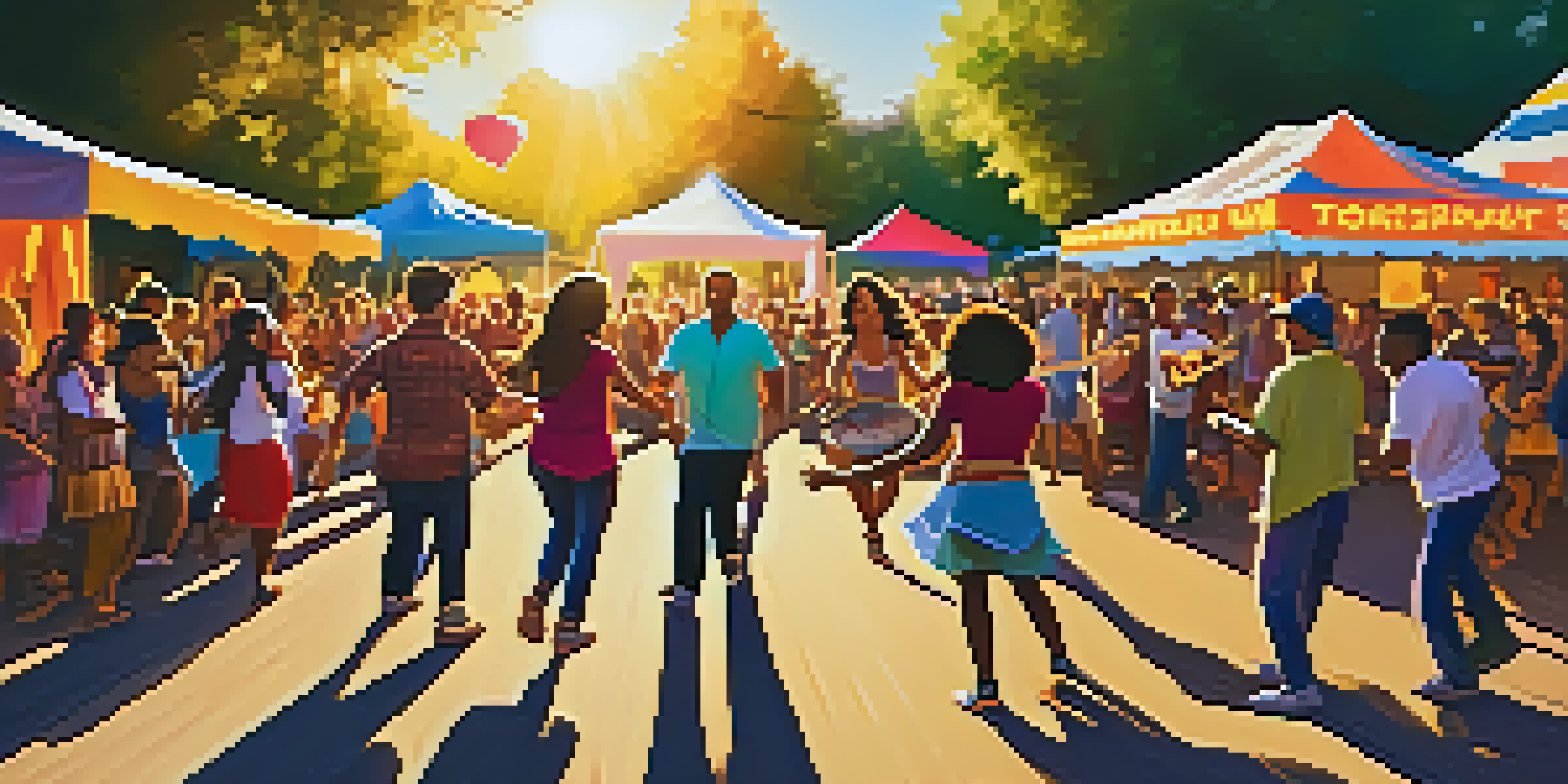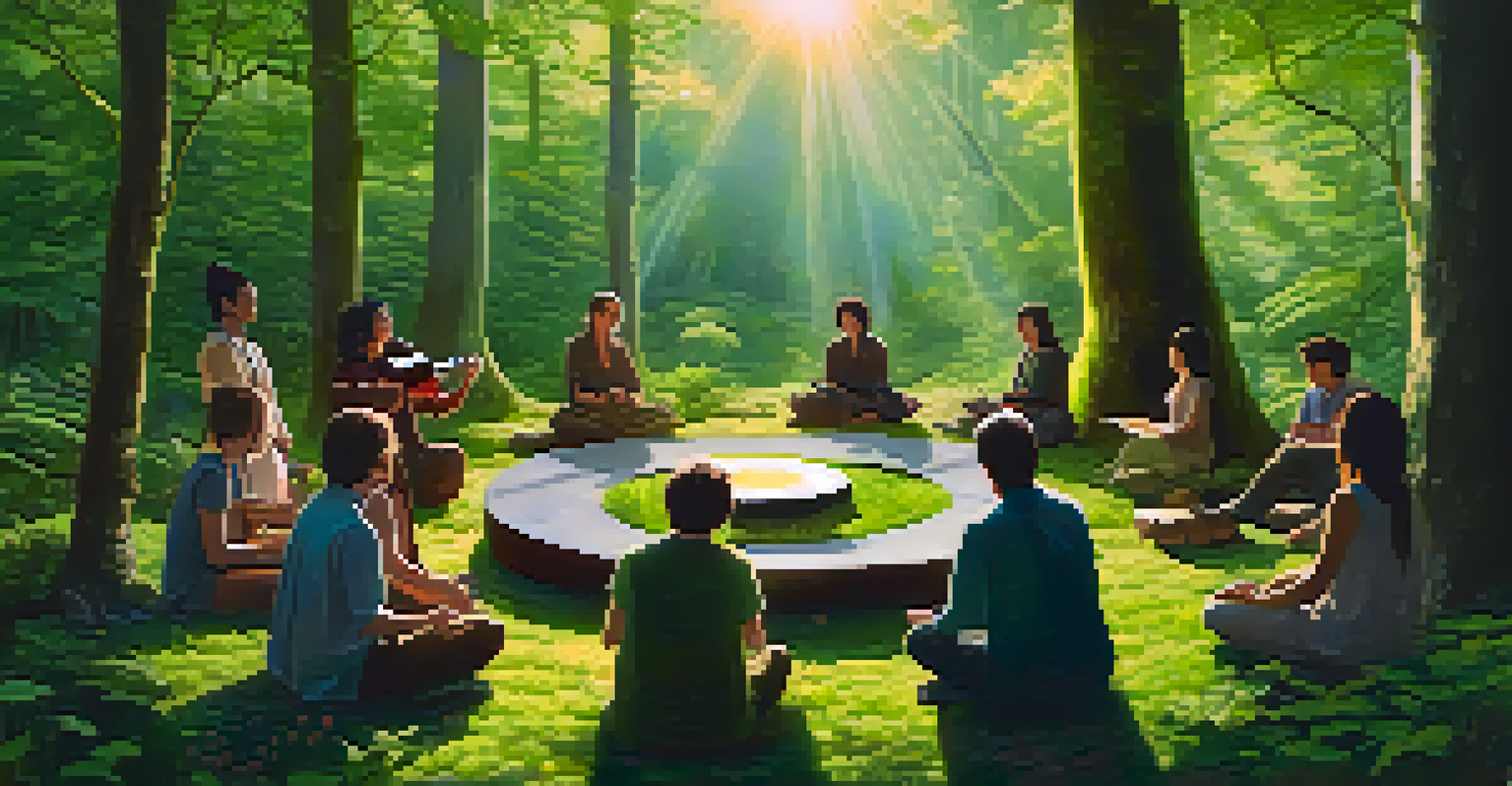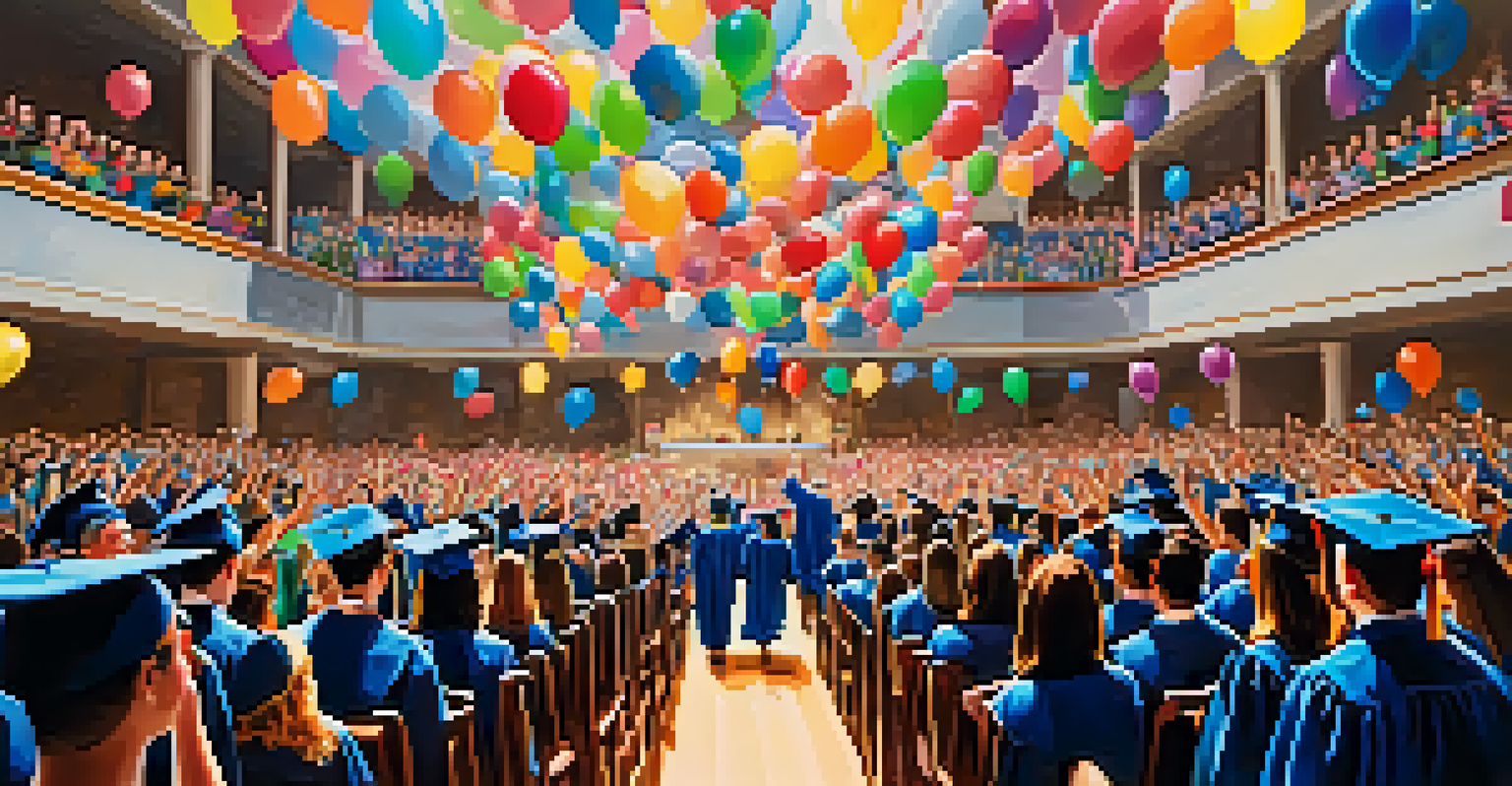The Role of Music in Rituals and Its Psychological Significance

Understanding Music's Place in Cultural Rituals
Music has been an integral part of human culture for centuries, often woven into the fabric of rituals. From weddings to funerals, music serves as a universal language that transcends barriers and connects people. It adds a layer of meaning and emotional depth, enhancing the experience of the ritual itself. Think about how a wedding march can evoke joy and anticipation, or how a dirge can create a profound sense of loss and reflection.
Where words fail, music speaks.
These rituals often rely on specific musical elements, such as rhythm and melody, to evoke particular emotions. For instance, lively rhythms might accompany celebratory events, while softer melodies might be reserved for moments of mourning. This relationship between music and ritual underscores the importance of sound in shaping human experiences and memories.
Ultimately, music does more than accompany rituals; it plays a critical role in marking significant life events. This interplay between music and rituals not only highlights cultural identity but also reinforces communal bonds among participants.
The Psychological Effects of Music in Rituals
Music has a powerful impact on our emotions and psychology, especially within the context of rituals. When we listen to music, our brain releases neurotransmitters like dopamine, which can elevate mood and foster feelings of connection. This is particularly important during rituals, as the emotional atmosphere can significantly enhance the overall experience for participants.

For instance, consider a graduation ceremony where an upbeat song is played as graduates walk across the stage. The music not only celebrates their achievement but also helps to create a collective memory among attendees, reinforcing the emotional significance of the event. This shows how music can enhance the shared experience, making it more memorable.
Music Enhances Rituals' Emotional Depth
Music serves as a universal language that adds meaning and emotional richness to cultural rituals.
Moreover, the use of music in rituals can promote psychological healing. Many cultures incorporate music in healing ceremonies, using sound to soothe anxiety, promote relaxation, and foster a sense of peace. This therapeutic aspect highlights music’s ability to influence our mental state, making it a powerful tool in ritualistic practices.
Music as a Tool for Community Bonding
Rituals often act as a focal point for community gatherings, and music plays a pivotal role in fostering a sense of belonging. When people come together to participate in a ritual that involves music, they share a collective experience that strengthens social ties. This is evident in events like community festivals, where music brings people together and encourages unity.
Music can change the world because it can change people.
For example, think of how a group of people might sing together during a religious service or a cultural celebration. This shared musical experience not only enhances the emotional atmosphere but also creates a sense of identity and belonging among participants. It’s a form of bonding that transcends individual differences, promoting inclusivity.
Additionally, this sense of community is often reinforced by cultural music traditions passed down through generations. These traditions serve as a reminder of shared values and history, helping to solidify social connections. In this way, music becomes a vehicle for community cohesion and cultural preservation.
The Symbolism of Music in Ritual Contexts
Music often carries deep symbolic meanings, especially in rituals. Different genres, instruments, or even specific songs can represent various themes, emotions, or cultural beliefs. For instance, drumming might symbolize strength and unity, while a lullaby might evoke comfort and safety.
This symbolism adds layers of meaning to rituals, enriching the participants' experience. For example, in many Indigenous cultures, certain songs are believed to connect the physical world with the spiritual realm, serving as a bridge during rituals. Understanding these symbols can deepen our appreciation for the ritual and the music that accompanies it.
Community Bonding Through Music
Shared musical experiences in rituals strengthen social ties and foster a sense of belonging among participants.
Moreover, the symbolism of music can also evolve over time, reflecting changes in cultural values and beliefs. This dynamic nature allows music to remain relevant in rituals, adapting to contemporary contexts while still honoring traditional meanings.
The Role of Live Music vs. Recorded Music in Rituals
The choice between live and recorded music can significantly influence the atmosphere of a ritual. Live music often brings a unique energy and spontaneity that can enhance the emotional experience. Musicians can respond to the crowd, adjusting the tempo or mood in real-time, creating a more immersive experience.
On the other hand, recorded music offers consistency and accessibility. It allows for a curated selection of songs that can evoke specific emotions, ensuring that the desired atmosphere is achieved. For instance, a carefully chosen playlist for a memorial service can help convey the intended sentiments, providing comfort to attendees.
Ultimately, both forms of music have their place in rituals. While live music fosters connection and spontaneity, recorded music can ensure that the emotional atmosphere is thoughtfully crafted. The choice often depends on the nature of the ritual and the desired emotional impact.
Music and the Ritual of Healing
Healing rituals often incorporate music as a way to promote emotional and psychological well-being. Music therapy has gained recognition for its ability to help individuals process trauma, grief, and stress. In many cultures, music is an integral part of healing ceremonies, aiding in recovery and providing solace.
For example, in some traditions, singing or chanting is used during healing ceremonies to create a calming environment. The rhythm and melody can help participants connect with their emotions, facilitating a deeper healing process. This highlights music's role as a therapeutic tool, fostering emotional release and support.
Healing Power of Music in Rituals
Incorporating music into healing rituals promotes emotional well-being and facilitates a supportive communal atmosphere.
Additionally, the communal aspect of music in healing rituals can provide a sense of support and belonging. When individuals come together to participate in a healing ritual, the shared experience of music can foster empathy and understanding, making the healing journey less isolating.
The Future of Music in Ritual Practices
As society evolves, so do our rituals and the role of music within them. With advancements in technology and the rise of digital platforms, the way we experience and share music in rituals is changing. Virtual ceremonies, live-streamed events, and digital playlists are becoming more common, expanding access to music and rituals for many.
This shift presents both opportunities and challenges. While technology allows for greater access, it can also dilute the communal experience that live music provides. It’s essential to find a balance between embracing innovation and preserving the emotional depth that music brings to rituals.

Looking ahead, the integration of diverse musical styles and cultural influences will likely continue to shape ritual practices. By blending traditional and contemporary elements, we can create rich, meaningful experiences that resonate with a broader audience. This evolution will ensure that music remains a vital component of rituals for generations to come.